The EQUNI (Emotional Quotient at University) project is a bold initiative placing emotional intelligence (EQ) and anti-discrimination at the heart of European higher education. It addresses a critical challenge: creating inclusive academic environments where empathy, and equity are as valued as academic excellence. What makes EQUNI innovative is its implementation within a technical university environment, where emotional and social competencies are not traditionally emphasized. Another standout feature of the project is its holistic approach to discrimination including trainings, issuing micro-credentials, developing mobile application and board game set in a university haunted by the invisible “Monster of Discrimination.” Through teamwork and challenges, participants build awareness of discrimination’s impact and develop their EQ. Although EQUNI is implemented in higher education, the game’s design makes it easily transferable and accessible to wider audiences beyond universities. EQUNI also lays the groundwork for a micro-credentialing system at TUL, making it the first Polish university to develop a procedure for issuing micro-credentials via the Europass platform. While the project issues credentials for students and staff, it enables the university to establish a sustainable framework supporting recognition of transversal skills in the long term. This system will also serve external learners, strengthening the university’s commitment to lifelong learning, upskilling, and community engagement. The project strongly supports EU priorities. By tackling discrimination in university environments, it fosters inclusive education systems that promote equity, social cohesion, and equal opportunities for all learners. By offering emotional intelligence training and issuing micro-credentials, EQUNI contributes to the development and recognition of transversal skills, such as empathy, and interpersonal communication, competencies identified by the EU as essential for personal, civic, and professional life. For more information, see: www.equni.eu

CATEGORY WINNER
EU Project of the Year Award
EQUNI: Implementing effective practices to develop emotional intelligence and combat discrimination in European HEIs
CATEGORY WINNER EU Project of the Year Award
Coming soon - Poland
"Ctrl+Alt+Empathy: Rebooting the University with Emotional Intelligence"
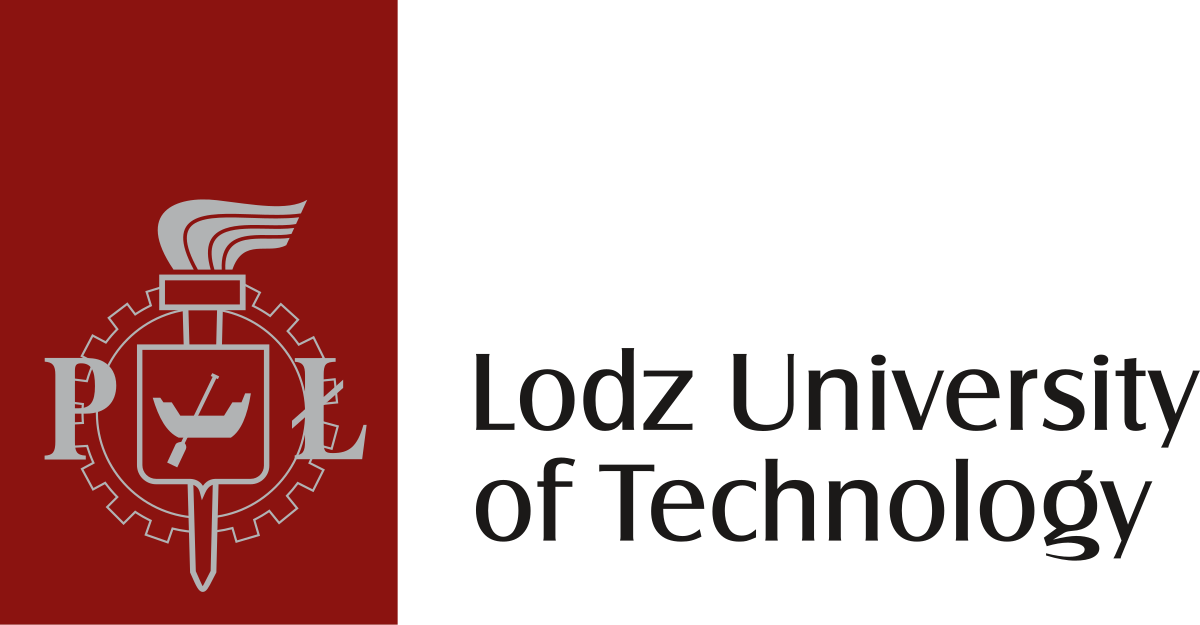
Have a say and vote for this entry to win the People's Choice Award!
500 points per vote
Provide your email address and click on "vote". You will then receive an email that enables you to verify your vote by clicking on a link.
Summary
Key People

Prof. Dorota Piotrowska
Director
International Cooperation Centre,
Lodz University of Technology

Małgorzata Jarczyńska
International Cooperation Centre
Lodz University of Technology

Justyna Kopańska
International Cooperation Centre
Lodz University of Technology
Acknowledgements
Slogan for our entry: Ctrl+Alt+Empathy: Rebooting the University with Emotional Intelligence
"Ctrl+Alt+Empathy"
This is a creative play on the well-known keyboard shortcut Ctrl+Alt+Del, which is used to restart a computer. In this phrase, Ctrl (Control) stands for self-control and emotional regulation, Alt (Alternative) suggests the need for a different, more human-centered approach to higher education, Empathy – replaces "Delete", implying that instead of deleting or force-quitting, we should restart with empathy. Together, "Ctrl+Alt+Empathy" symbolizes a call for a system reboot of the university model, not through force or deletion, but through emotional intelligence and compassion.
"Rebooting the University with Emotional Intelligence"
This part suggests that universities (especially technical ones) often prioritize hard skills and knowledge, while emotional intelligence is overlooked. The phrase advocates for placing empathy, self-awareness, and inclusive behaviours at the core of teaching and learning, as well as recognizing that true innovation includes not only technology, but also human connection and engagement.
In short, our slogan means it is time to restart higher education with a new operating system powered by emotional intelligence.
Organisations affiliated with the project: Lodz University of Technology, Poland (coordinator), University of Algarve (PT), University of Groningen (NL), SumFuo (FR) and Team Coaching (PL)
Images
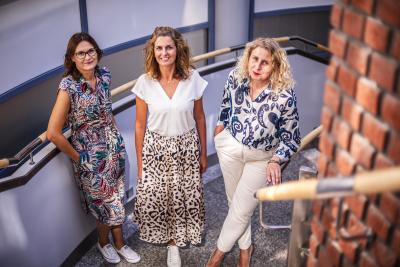
Project Team from Lodz University of Technology
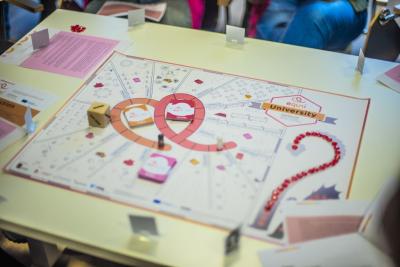
The EQUNI Board Game
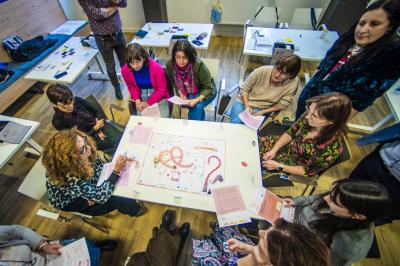
EQUNI Training: Smart Hearts, Open Minds - Navigating Emotions and Diversity in Education
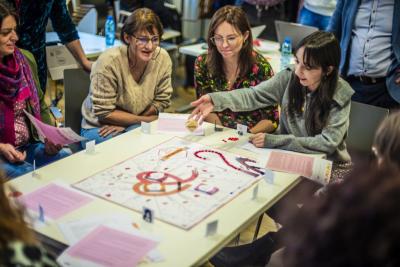
EQUNI Training: Smart Hearts, Open Minds - Navigating Emotions and Diversity in Education
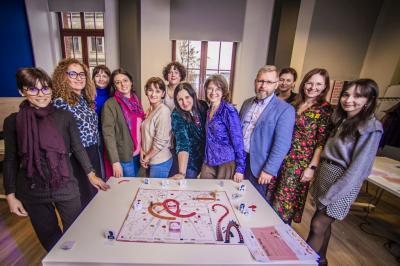
EQUNI Training: Smart Hearts, Open Minds - Navigating Emotions and Diversity in Education
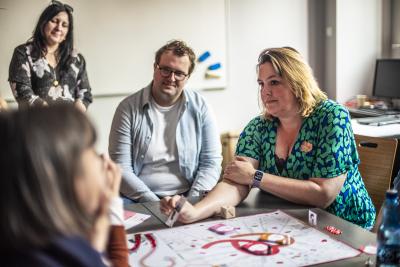
EQUNI Training: Ctrl+Alt+Empathy - Rebooting the Classroom with Emotional Intelligence
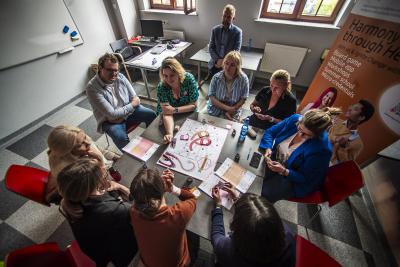
EQUNI Training: Ctrl+Alt+Empathy - Rebooting the Classroom with Emotional Intelligence
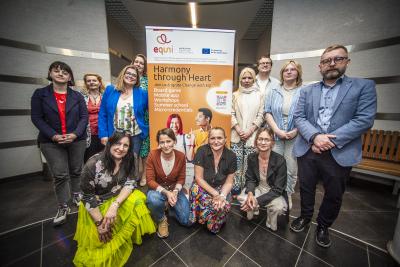
EQUNI Training: Ctrl+Alt+Empathy - Rebooting the Classroom with Emotional Intelligence
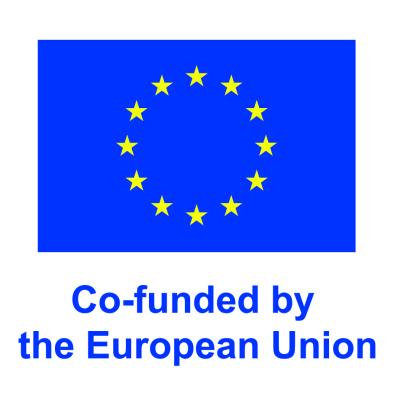
EQUNI project is co-funded by the European Union
IMPACT STORY
Impacting lifes
Every EQUNI board game session ends with a guided reflection led by a moderator. This final phase is often the most powerful part of the experience - when players share their personal insights and we can hear moving stories.
During one session, a student shared how the project transformed their perspective on diversity and empathy. Previously, they had felt isolated in a highly technical environment where emotions were often overlooked. Through the EQUNI game, they experienced firsthand how discrimination can be subtle yet deeply damaging. This new awareness encouraged them to confront biases they had not recognized before and develop emotional skills to better communicate and collaborate with peers from diverse backgrounds.
A particularly powerful moment occurred during a game session involving players of different age - students, junior staff, and senior educators. As they played, they discovered generational differences in how discrimination is perceived and addressed. These conversations sparked deep reflection, allowing participants to step into one another’s shoes and foster intergenerational learning.
Still, the most moving moments are those when players realize - often for the first time - that they themselves have unintentionally engaged in or contributed to discriminatory behaviours. The silence that follows, the visible discomfort, and the courage to admit and reflect on it make these experiences deeply transformative.
These emotional turning points show how EQUNI inspires real change, within individuals and the broader academic culture. It proves that meaningful transformation can start with a simple board game and ripple through generations and entire communities.
LEARNINGS
Lessons learned
One of the most surprising and rewarding outcomes of the EQUNI project was the snowball effect it created. Participants who attended the training and/or played the game enthusiastically shared their experiences with colleagues and students, sparking wider interest across the university. This word-of-mouth enthusiasm showed that even in a technical university, often perceived as focused mainly on hard skills, both staff and students are eager to develop emotional intelligence and see clear benefits in doing so. This revealed a strong underlying need for emotional and social competencies across all fields.
Another key learning was the power of gamification. Using the EQUNI board game made complex and sensitive topics accessible and engaging, encouraging honest dialogue. This simple tool proved effective and successfully served its intended purpose.
From a university management perspective, openly acknowledging the issue of discrimination is essential. Only by recognizing our challenges can we take meaningful steps toward creating a more inclusive and equitable environment. For those embarking on similar initiatives, we advise combining simple but interactive tools with institutional commitment. Leadership must openly acknowledge challenges like discrimination and support ongoing education. It is also crucial to involve diverse stakeholders - students, staff, and external experts - to ensure the program resonates widely. When people experience the value firsthand, they become advocates who naturally spread the message. Leadership should encourage this momentum by providing ongoing opportunities for learning and recognition, such as micro-credentials, which motivate continued development. This holistic approach creates sustainable change and demonstrates that emotional intelligence is a vital transversal skill, even in technical fields.
FUTURE PLANS
What's coming?
Our top priority is fully implementing the procedure for issuing micro-credentials at the university, which can be awarded to a broad group of users, not only students and staff but also to external participants, widely understood lifelong learners. This inclusivity highlights our university as an open and welcoming place for everyone.
Beyond our institution, we actively share experiences and best practices with other universities and partners across Europe. We recognize a real and growing need for micro-credentials as flexible, transparent proof of competencies in today’s dynamic education and job markets. By promoting this approach, we aim to encourage wider adoption and create stronger networks that support continuous learning and inclusion.
Building on EQUNI’s success, Lodz University of Technology plans to expand emotional intelligence and anti-discrimination initiatives beyond the university sector, adapting the EQUNI game and workshops for workplaces and community organizations. We aim to develop multilingual versions of the game to increase accessibility across Europe. The university is also exploring ways to integrate emotional intelligence more deeply into academic curricula and staff training. Future collaborations with partners across sectors will focus on creating inclusive environments that foster respect, empathy, and equality.
By leading these efforts, we hope to inspire other technical universities to embrace emotional intelligence as a core competency, proving that technology and empathy go hand in hand in shaping a better society, even though this connection is not always obvious.

